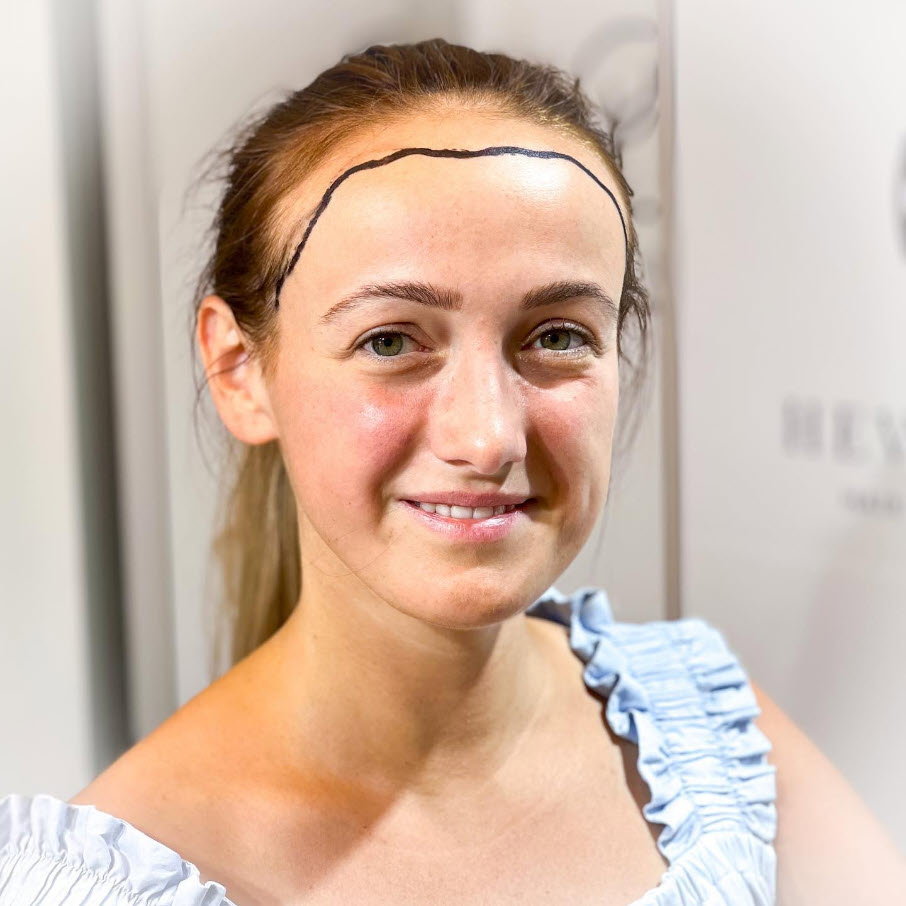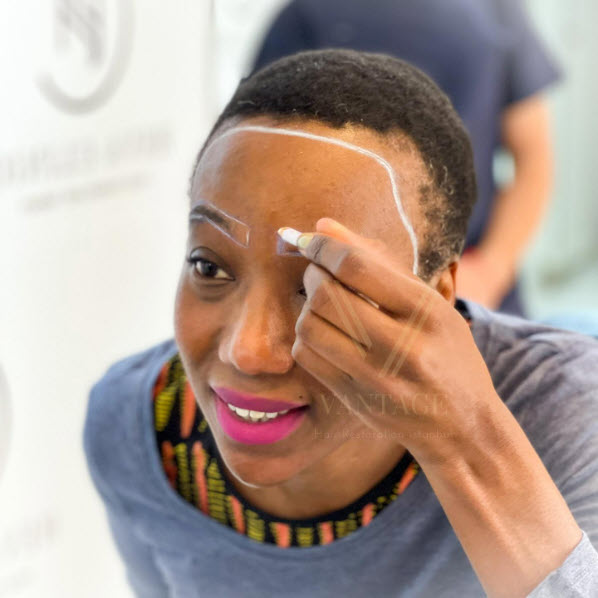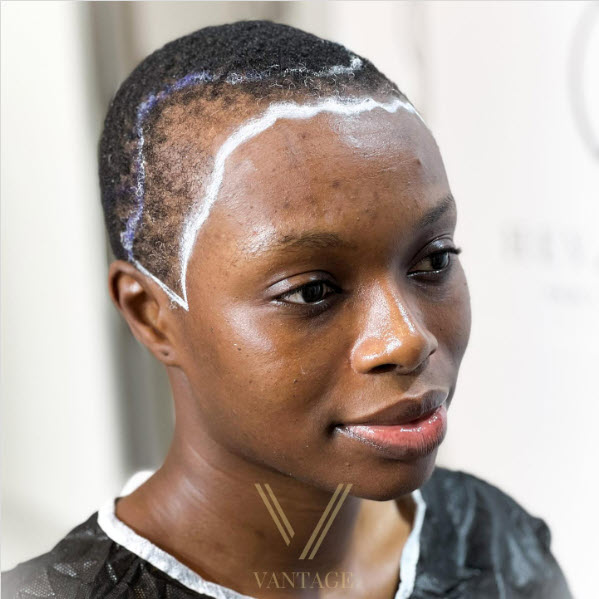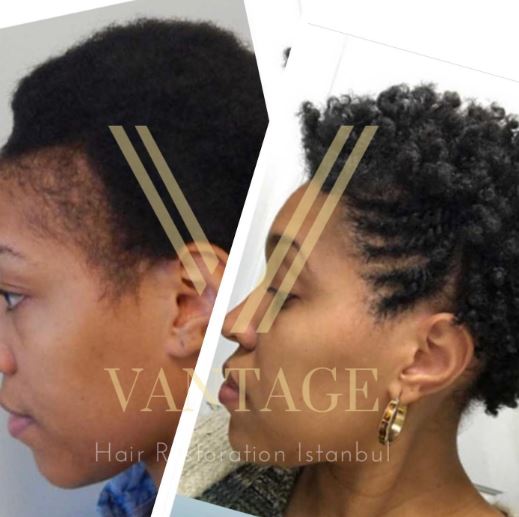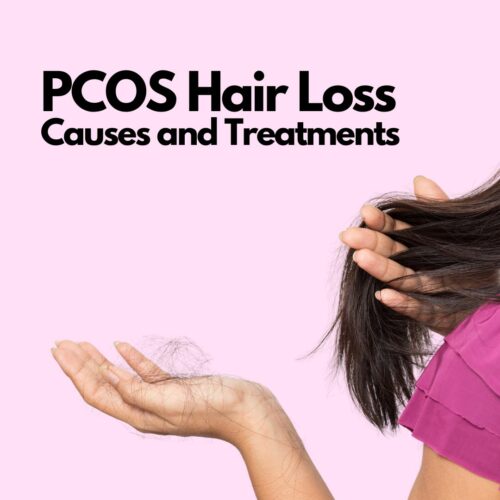
PCOS hair loss: causes and treatments should be diagnosed to treat it accordingly.
Hair loss is becoming an increasingly common concern these days. While it may seem like it is only a problem that men face, women also experience hair loss. It can have a significant impact on one’s self-esteem, especially for women, who may experience it due to various reasons such as stress, aging, menopause, childbirth, and a medical condition called Polycystic Ovary Syndrome (PCOS). PCOS is a condition that can cause severe hair loss in women and has several other challenging symptoms. Keep reading to learn more about PCOS and hair loss, causes and treatments.
What causes PCOS?
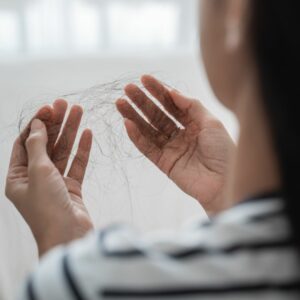
PCOS is a medical condition wherein small cysts develop within the ovaries, which is usually painless. These cysts hinder the eggs from being released during ovulation, resulting in difficulty in conceiving. Though the exact cause of PCOS hair loss is not known, genetics is believed to play a significant role. Hormonal imbalances can also lead to this condition. Furthermore, being overweight or obese can also contribute to the development of PCOS. [1]
What are the symptoms of PCOS?
PCOS is a hormonal disorder that can cause a variety of symptoms. The most common symptom is hair loss in a Christmas tree thinning pattern on the crown area of the scalp. This can be distressing for those who experience it, but it is important to remember that there are treatments available. Other symptoms of PCOS may include the absence of other androgen-related signs or symptoms, such as hirsutism or irregular periods/ovulation. [2]
If you are experiencing any of these symptoms, it is best to consult your doctor for proper diagnosis and treatment. It is also worth noting that PCOS patients have increased levels of androgenetic hormones, which can lead to weight gain. However, with proper management, including diet, exercise, and medication, it is possible to manage the symptoms of PCOS and live a healthy, fulfilling life.
Does PCOS cause hair loss?
Did you know that women with PCOS observe hair loss 2 times more? This type of hair loss is known as female pattern hair loss and is typically localized on the crown of the head. Hormonal imbalances caused by PCOS can lead to increased levels of androgens, which can cause male pattern baldness. So, does PCOS cause hair loss, yes it does; sadly, that’s not all – PCOS can also cause hair follicles to become thinner and more brittle, which makes hair more prone to breaking and falling out.
How I reversed my PCOS hair loss?
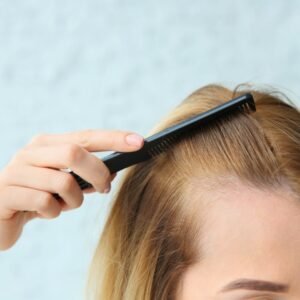
Reversing hair loss caused by PCOS can be a daunting task, but by taking several steps, it is possible to stop and even reverse the condition. Let’s delve into the details of how to reverse PCOS-related hair loss.
How to stop PCOS hair loss?
Seeking professional help is essential to effectively stopping PCOS hair loss. Many women with PCOS have insulin resistance, which can exacerbate hair loss. Insulin levels should be managed through dietary changes, exercise, and medication to improve hair health.
Elevated androgen levels are a major contributor to hair loss in PCOS, so treatments that target androgens may be beneficial. These can include medications like oral contraceptives or anti-androgen drugs, which can help regulate hormone levels and reduce hair loss. Women with PCOS can effectively manage hair loss and improve their overall health by taking these steps.
PCOS Hair Loss Treatments
To naturally treat PCOS, the first step is to adopt a healthy lifestyle, which includes making changes to your diet, avoiding strenuous activities and environments, and more. Additionally, it’s essential to learn how to manage this condition to minimize its effects with PCOS hair loss treatment. If you’re experiencing hair loss as a result of PCOS, there are several effective treatment options available. Let’s take a closer look at each to help you determine the best course of action for your needs.

PRP for PCOS hair loss
Platelet-rich plasma or PRP, is a non-surgical treatment for cellular rejuvenation. It can treat various areas of the body, from the knees to the scalp, and is helpful in treating PCOS-related hair loss. One of the main advantages of PRP treatment for hair transplant is that it minimizes side effects since it is produced using your blood.
PRP treatment is a relatively simple procedure. First, a small blood sample, similar to a regular blood test, is taken from the patient. The sample is then put into a centrifuge, which separates plasma from other components. The blood sample is then drawn into tiny needles, 0.4 diameters, and injected into the scalp. After the injection, the scalp is gently massaged with circular movements.
While PRP treatment offers significant results, multiple sessions are recommended for the best outcome. Furthermore, it’s essential to note that it may not provide long-lasting results.
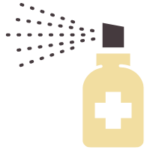
Minoxidil for PCOS hair loss
Minoxidil is an FDA-approved topical drug that is used to stop hair loss. Minoxidil acts as a vasodilator, which enhances blood flow by enlarging blood vessels. With enhanced blood flow, hair loss is stopped with this medication. Using Minoxidil for PCOS hair loss may be beneficial since it doesn’t require hormonal treatment. Topical Minoxidil is suitable for daily use, however, you should keep in mind that the dilution of this medication varies for men and women, so it’s essential to use it monitored by a specialist.

Finasteride for PCOS hair loss
Finasteride is an FDA-approved medication that slows down hair loss by acting as a 5-alpha reductase inhibitor, preventing the conversion of testosterone to dihydrotestosterone—the primary cause of androgenetic alopecia. Unlike Minoxidil, which is applied topically, Finasteride directly influences hormonal balance, making it generally unsuitable for women. Additionally, Finasteride carries the risk of severe side effects, thus it is essential to use it under the close supervision of a specialist. [3]
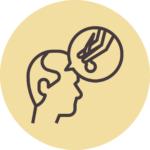
Hair transplant for PCOS hair loss
Hair transplant is the most efficient treatment option for PCOS hair loss. Since it involves transplanting healthy hair follicles from a donor area to the recipient area, hair transplant offers long-lasting results. However, getting a hair transplant to treat PCOS hair loss requires expertise and precision, so it’s essential to choose a qualified surgeon. Furthermore, before getting a hair transplant to treat PCOS, it’s essential to wait for hair loss to settle.
What is the best treatment for PCOS hair loss?
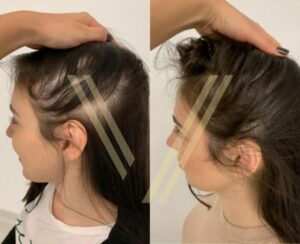
Getting a hair transplant is the best treatment for PCOS hair loss. Hair transplants provide efficient results. Hair transplants are highly customizable to each individual’s unique needs and aesthetic goals. Hair transplant specialists work closely with patients to design a treatment plan that addresses specific areas of concern and achieves the desired hairline, density, and overall appearance.
Although hair transplants provide efficient results for treating hair loss, they may not be the solution for the root of this problem since it has nothing to do with hair loss. Hormonal imbalance causes PCOS, so hormonal treatments are more beneficial for treating the condition itself.
Can I get a hair transplant with PCOS?
If you have been struggling with hair loss due to PCOS, it’s understandable to feel frustrated and concerned about your options. However, it’s essential to know that getting a hair transplant with PCOS is possible. Since hormonal imbalances cause the condition, a hair transplant can be done without any issues once hair loss is resolved. So, if you’re interested in getting a hair transplant, don’t let PCOS hold you back. Please don’t hesitate to consult with our medical consultants.
What is the success rate of PCOS hair transplant?
A hair transplant is a highly effective treatment that can help restore hair loss caused by PCOS. Compared to other restoration methods, it has a success rate of 98% when performed by a qualified specialist. However, it’s important to remember that the success of the procedure depends on multiple factors, including the structure of your hair and the aftercare routine that you follow. By following a proper aftercare routine and working with a qualified specialist, you can maximize your chances of achieving successful results.
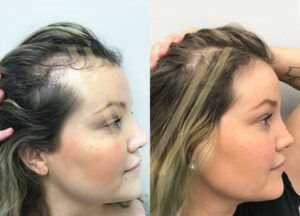
Is hair transplant a permanent solution for PCOS hair loss?
Hair transplants are an effective long-term solution for most people. However, in the case of Polycystic Ovary Syndrome (PCOS) hair transplants, while the success rate is high, there is a slight chance the procedure may not be successful. To avoid this, it is crucial to follow your doctor’s advice and maintain a healthy lifestyle. This includes eating a well-balanced diet and keeping a positive outlook on life. By doing so, you can increase the chances of your hair transplant’s success and enjoy the benefits of a full head of hair for years to come.
Do I need to shave my head for a hair transplant?
For many people, the thought of shaving their heads is a major concern that can prevent them from pursuing the procedure. The good news is that an unshaven hair transplant may be an option, particularly if they are experiencing hair loss due to PCOS.
With an unshaven hair transplant, you don’t need to shave your head entirely. Depending on the severity and location of your hair loss, you may opt for a partially-shaven or completely unshaven procedure. This means you can avoid the discomfort and inconvenience of a full head shave while still getting the hair transplant you need.
FAQs about PCOS Hair Loss
What is the best hair shampoo for PCOS hair loss?
If you’re experiencing hair loss due to PCOS, selecting the best shampoo can make all the difference in promoting hair growth. However, finding the right one requires careful consideration. While a good shampoo can yield positive results, a poor choice can exacerbate the situation.
To find the best shampoo for PCOS-related hair loss, look for a mild, pH-balanced formula with healthy ingredients such as biotin, zinc, and ketoconazole. These ingredients can help promote hair growth and improve hair health overall. On the other hand, it’s important to avoid shampoos with harsh chemicals like SLS, fragrances, and salt. These ingredients can further damage hair and worsen hair loss.
By prioritizing a shampoo that nourishes and supports the health of your hair, you can help mitigate the effects of PCOS-related hair loss and promote healthy hair growth.
What are the best supplements for PCOS hair loss?
Supplements are helpful to use for PCOS hair loss. Certain vitamins and minerals have been linked to promoting healthy hair growth. These include vitamins C, D and biotin, a water-soluble B vitamin. Zinc, a mineral, may also help with hair loss and hirsutism in people with PCOS.
People with female pattern hair loss may have low iron levels. Although there is limited evidence of iron’s effectiveness in treating hair loss, supplementing with iron may be beneficial, especially if your iron levels are lower than the average. However, it is essential not to exceed the daily recommended dose of iron, as overdose can have serious consequences. Before starting any supplements, it is best to consult with a healthcare professional.
What are the best vitamins for PCOS hair loss?
Incorporating the right vitamins into your diet can make a big difference. Vitamin E, Vitamin B, Vitamin C, and Vitamin D are all known to help slow down hair loss and boost hair rejuvenation. Adding these essential vitamins to your daily routine gives your hair the best chance to stay healthy and strong.[4]
How long does a hair transplant for PCOS take?
A hair transplant for PCOS usually takes 7-8 hours on average. The duration of a PCOS hair transplant varies depending on the location and extent of hair loss. Also, the duration of a PCOS hair transplant varies by the method you choose for the procedure.
Polycystic ovary syndrome (PCOS) is a challenging condition that can significantly impact the daily lives of women. The symptoms not only affect physical health but also take a toll on emotional well-being, causing a decline in self-esteem.
However, there is hope for those struggling with hair loss due to PCOS. At Vantage Hair Clinic, we offer a personalized approach to hair transplantation, tailored to the specific cause of hair loss. Our experienced medical team provides long-lasting and effective results. Get in touch with our medical consultants by clicking the button below to learn more.
References:
-
- Indications of causes of PCOS. Eunice Kennedy Shriver National Institute of Child Health and Human Development. Polycystic Ovary Syndrome (PCOS): Overview. September 2016. Available at https://www.nichd.nih.gov/health/topics/pcos/conditioninfo/causes.
- Carmina E, Azziz R, Bergfeld W, et al. Female pattern hair loss and androgen excess: a Multidisciplinary Androgen excess and PCOS Committee report. J Clin Endocrinol Metab. 2019 Jul 1;104(7):2875-91. https://pubmed.ncbi.nlm.nih.gov/30785992.
- Iamsumang, W., Leerunyakul, K., & Suchonwanit, P. (2020). Finasteride and Its Potential for the Treatment of Female Pattern Hair Loss: Evidence to Date. Drug design, development and therapy, 14, 951–959. https://doi.org/10.2147/DDDT.S240615.
- Bassino, E., Gasparri, F., & Munaron, L. (2020). Protective Role of Nutritional Plants Containing Flavonoids in Hair Follicle Disruption: A Review. International journal of molecular sciences, 21(2), 523. https://www.mdpi.com/1422-0067/21/2/523.
Article Review By: Dr. Jyothi Shenoy V
Profile Link
MBBS, MD – Obstetrics & Gynaecology, MRCOG(UK)
23 Years Experience Overall

